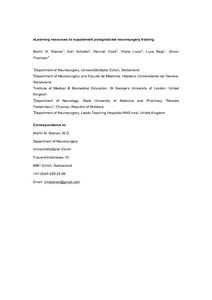Stienen, MN; Schaller, K; Cock, H; Lisnic, V; Regli, L; Thomson, S
(2017)
eLearning resources to supplement postgraduate neurosurgery training.
Acta Neurochir (Wien), 159 (2).
pp. 325-337.
ISSN 0942-0940
https://doi.org/10.1007/s00701-016-3042-7
SGUL Authors: Cock, Hannah Rutherford
![[img]](https://openaccess.sgul.ac.uk/108467/7.hassmallThumbnailVersion/Elearning_20161117_complete.pdf)  Preview |
|
PDF
Accepted Version
Available under License ["licenses_description_publisher" not defined].
Download (1MB)
| Preview
|
Abstract
BACKGROUND: In an increasingly complex and competitive professional environment, improving methods to educate neurosurgical residents is key to ensure high-quality patient care. Electronic (e)Learning resources promise interactive knowledge acquisition. We set out to give a comprehensive overview on available eLearning resources that aim to improve postgraduate neurosurgical training and review the available literature. MATERIAL AND METHODS: A MEDLINE query was performed, using the search term "electronic AND learning AND neurosurgery". Only peer-reviewed English-language articles on the use of any means of eLearning to improve theoretical knowledge in postgraduate neurosurgical training were included. Reference lists were crosschecked for further relevant articles. Captured parameters were the year, country of origin, method of eLearning reported, and type of article, as well as its conclusion. eLearning resources were additionally searched for using Google. RESULTS: Of n = 301 identified articles by the MEDLINE search, n = 43 articles were analysed in detail. Applying defined criteria, n = 28 articles were excluded and n = 15 included. Most articles were generated within this decade, with groups from the USA, the UK and India having a leadership role. The majority of articles reviewed existing eLearning resources, others reported on the concept, development and use of generated eLearning resources. There was no article that scientifically assessed the effectiveness of eLearning resources (against traditional learning methods) in terms of efficacy or costs. Only one article reported on satisfaction rates with an eLearning tool. All authors of articles dealing with eLearning and the use of new media in neurosurgery uniformly agreed on its great potential and increasing future use, but most also highlighted some weaknesses and possible dangers. CONCLUSION: This review found only a few articles dealing with the modern aspects of eLearning as an adjunct to postgraduate neurosurgery training. Comprehensive eLearning platforms offering didactic modules with clear learning objectives are rare. Two decades after the rise of eLearning in neurosurgery, some promising solutions are readily available, but the potential of eLearning has not yet been sufficiently exploited.
| Item Type: |
Article
|
| Additional Information: |
The final publication is available at Springer via http://dx.doi.org/10.1007/s00701-016-3042-7 |
| Keywords: |
Education, Electronic learning resource, Internet, Neurosurgery, New media, Postgraduate training, Resident training, eLearning, Neurology & Neurosurgery, 1103 Clinical Sciences, 1109 Neurosciences |
| Journal or Publication Title: |
Acta Neurochir (Wien) |
| ISSN: |
0942-0940 |
| Language: |
eng |
| Dates: |
| Date | Event |
|---|
| February 2017 | Published | | 5 December 2016 | Published Online | | 23 November 2016 | Accepted |
|
| Publisher License: |
Publisher's own licence |
| PubMed ID: |
27921190 |
 |
Go to PubMed abstract |
| URI: |
https://openaccess.sgul.ac.uk/id/eprint/108467 |
| Publisher's version: |
https://doi.org/10.1007/s00701-016-3042-7 |
Statistics
Item downloaded times since 07 Mar 2017.
Actions (login required)
 |
Edit Item |



